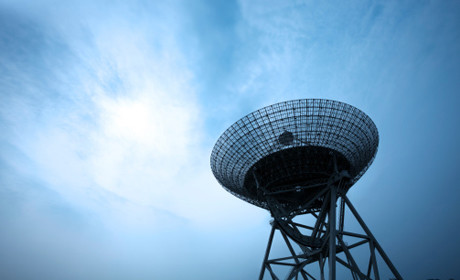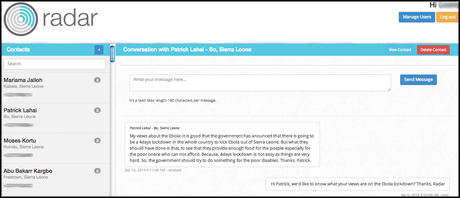
Living in Kailahun, a remote forest town of red dirt roads in north-east Sierra Leone, Moses Kortu was on the front line of the country's Ebola crisis when it broke in June.
Sierra Leone is second only to Liberia in terms of the number of reported cases, but with limited connectivity and government-imposed lockdowns shutting banks, borders and markets, local stories were not reaching the wider audience they deserved.
"Moses was right on the border, in the region it spread into from Liberia, and he started sending these SMS reports about what was going on there," explained Paul Myles, editorial lead at media development and citizen journalism organisation Radar.
"As we followed it we realised that region was one of the worst hit, that no one was reporting directly from there, so we've been developing stories by him giving us updates."[Most stories] come from Freetown or Dakar or press releases via the World Health OrganisationPaul Myles, Radar
Radar's work in training reporters in developing countries and receiving copy via SMS has been ongoing since 2012, when Kortu himself was trained. Previously copy was received using Google's Gmail to SMS service.
But as the organisation has grown, and with it the need for greater control and security around reports, all correspondence is now made through Radar's new, custom-built and encrypted editorial hub.
"When we come in in the morning and throughout the day we'll be on the hub," Myles told Journalism.co.uk. "We log in and from there we get a live feed of messages coming through from our reporters in different countries."
Editors can reply via the hub, either on desktop or on mobile, and develop the story with the reporter before sharing the updates to social media.

A screengrab of Radar's editiorial hub, canvassing reporters' opinion of the government lockdown. Image courtesy of Radar.
"People who are off-grid and don't have access to the digital conversation – don't have smartphones or 3G – can SMS," said Myles, "and we put their opinion or their reporting out via Twitter or Facebook by sharing it directly from the hub."
Editors can also reach out directly to reporters in specific regions to crowdsource ideas and opinions on important issues, keeping everyone up to date with what is happening on the ground.
When the stories are newsworthy on a international level, as with some of Kortu's reports, the editorial team can continue the conversation and develop with the reporter.
Kortu's story on the effects of the quarantine – rising food prices and diminishing stocks – was published by Channel 4 News in August.
He has also featured on the BBC World Service, on The Huffington Post with fellow Radar trainee Amjata Bayoh, and on South Korean Television, said Myles.
"Moses found himself at the epicentre of this crisis and has been one of the only reporters there," he said.
"It would have taken a long time to get to a computer and get internet at quite a lot of personal expense. It would slow down his storytelling which is the reason why there have been hardly any articles coming out form the ground, from people living there.
"[Most stories] come from Freetown or Dakar or press releases via the World Health Organisation or Médecins Sans Frontières or someone like that, but he's been living in an affected community and able to use the hub to share his perspectives."
Helping engaged members of remote communities get their story to the wider world is the whole ethos behind Radar, especially in areas where governments can be repressive and citizen's voices are not being heard.You'd never have a situation like the smashing up of hard drives in the Guardian basementPaul Myles, Radar
However, the new editorial hub has both the security and flexibility to assure Radar's reporters that their identities will be protected.
"We're doing a project in India on modern day slavery, close to labour lines," Myles said.
"Security was important for that, and also [for] a project with LGBT communities in Uganda as there's a potential high risk involved there as well."
All data is encrypted on the Radar servers before being distributed "across various locations" in Europe, where data protection laws are stricter.
"You'd never have a situation like the smashing up of hard drives in the Guardian basement," Myles said.
Although Kortu's reporting is a classic case of local stories getting picked up by national or international news outlets to provide a fresh angle on a developing issue, Myles said he hoped the hub could be used in other areas to connect remote communities with the wider media.
"Access to information as it happens on the ground has been difficult to come by for big news organisations," he said.
"Having a reporter on the ground being able to stay in touch throughout the day has been a great example of a cut-off region being able to contribute to the global dialogue."
Free daily newsletter
If you like our news and feature articles, you can sign up to receive our free daily (Mon-Fri) email newsletter (mobile friendly).
Related articles
- What AI can do for your newsroom: tips from Ring Publishing's latest handbook
- 200 speakers you need at your next journalism event to avoid all-male panels
- How young leaders can shape the future of the media industry
- Tools, tactics, and success stories of newsroom innovation in 2023
- How news brands can win over young audiences, with Danuta Breguła









